If You Notice This on a Potato, Don't Eat It, Experts Warn
It could lead to serious health consequences.
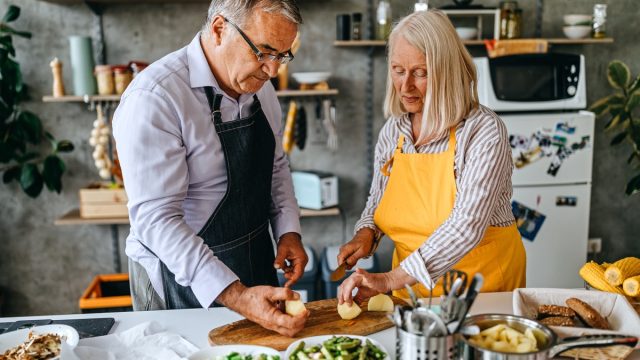
We've all been guilty of leaving a bag of potatoes in our pantry longer than we should, but many of us assume that taking a vegetable peeler to any soft spots or grown sprouts makes a potato that may be past its prime good to go again. But that's not exactly the case. Experts say there is one telltale sign that a potato is too dangerous to consume, even if you have your cutting utensils on hand to slice off any unsavory areas. Read on to find out when you should be tossing a potato instead of trying to salvage it.
RELATED: The One Vegetable You Should Never Eat Raw, CDC Warns.
If your potato has green spots, don't eat it.
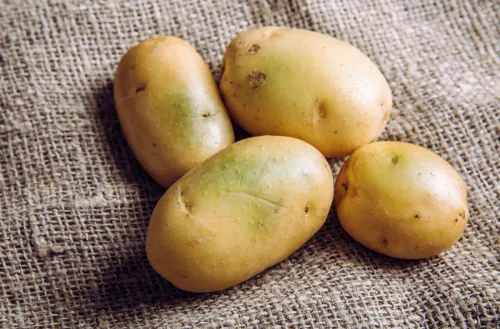
You might think you can simply slice off any green spots on your potato and still eat it, but you're not resolving the issue at hand. According to Healthline, a potato turns green when it begins to produce chlorophyll, which is a natural process. But when you notice that pigment, it means your potato has also started to produce solanine, another compound that protects against damage from animals, insects, bacteria, and fungi.
However, solanine is a toxin that permeates the potato, not just the green spots, and high levels of it can be dangerous for humans.
Just one bad potato could make you sick.
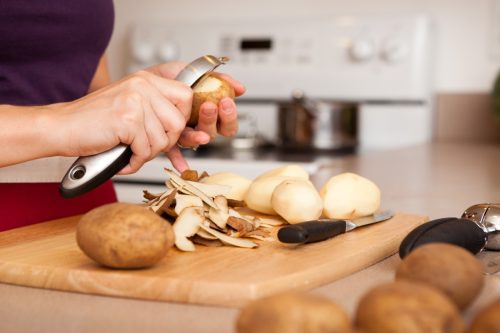
Solanine levels are highest in a potato's skin, so peeling a green potato will help reduce the toxin, but it doesn't fully resolve the problem. A 2005 case study published in the journal Regulatory Toxicology and Pharmacology found that peeling a potato only reduces around 30 percent of its toxic plant compounds so 70 percent may still be left in a peeled potato.
According to Heathline, experts aren't certain how much solanine it takes to make you sick as it's unethical to test this on humans. But the case study found that consuming just 0.6 milligrams worth of solanine per pound of weight can lead to illness. "That means that eating a 16-ounce potato that has surpassed the acceptable level of 20 mg solanine per 3.5 ounces (100 g) would be enough to make a 110-pound person sick," Healthline explains.
It's especially important to keep green-spotted potatoes away from frail people or children, who have lower body masses, and are therefore even more at risk for solanine poisoning, according to Michigan State University.
And for more food safety news, sign up for our daily newsletter.
If you notice severe signs of solanine poisoning, call your doctor.
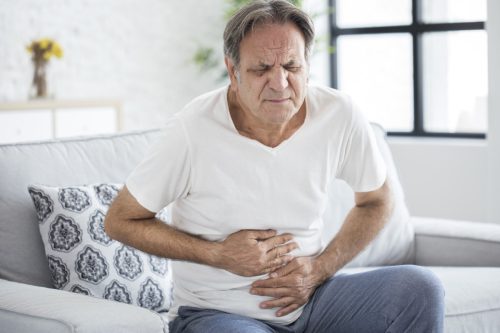
If you have eaten a green potato, even peeled or without the green bits, it's important to monitor yourself for symptoms of solanine poisoning. According to Medical News Today, common symptoms include fever, headache, pain in the stomach or abdomen, diarrhea, lower-than-normal body temperature, vomiting, slow pulse, and slow breathing.
If you think you have developed any of these symptoms, you should seek immediate medical care. According to Heathline, mild symptoms can resolve in about 24 hours, but there have been reports of severe effects from solanine poisoning, such as paralysis, convulsions, breathing problems, coma, and even death.
Proper storage can reduce the chances of your potato developing high solanine levels.
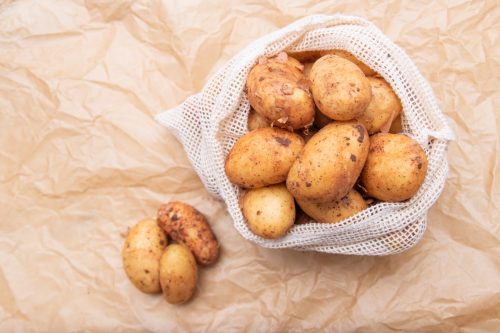
How you store your potatoes can make them more or less likely to develop higher levels of solanine. According to Heathline, physical damage, exposure to light, and high or low temperatures can all result in potatoes developing more of this toxin.
It's best to store potatoes in a cool, dark place such as a root cellar or basement to try to avoid this process. You should also keep potatoes in an opaque sack or plastic bag to keep any additional light from hitting them.
"Be sure to inspect potatoes before purchasing them to make sure they have not been damaged or already started greening," Heathline advises.
RELATED: Never Eat Leftovers That've Been in the Fridge This Long, Experts Warn.





















